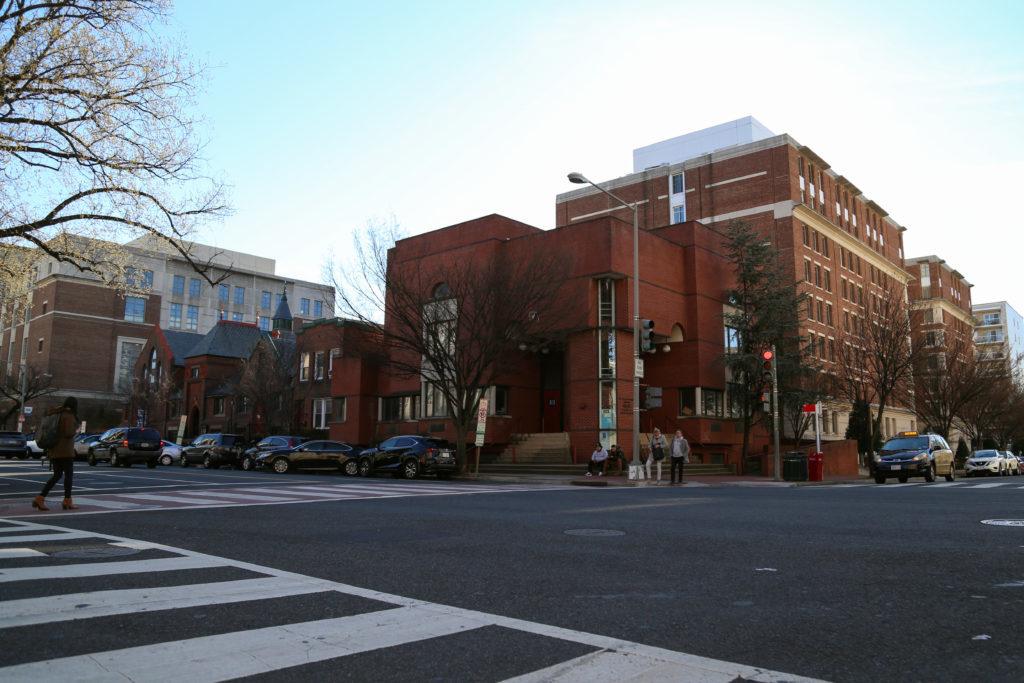After a three-year-long neighborhood battle, an appellate court ruled last week that the planned renovation of GW Hillel’s campus center can move forward.
In a Dec. 7 ruling, the D.C. Court of Appeals upheld a 2015 decision by the D.C. Zoning Commission approving the project and allowing GW Hillel to avoid some zoning regulations in constructing the new building. The ruling allows GW Hillel to begin construction on its long-awaited new campus center.
GW Hillel planned to demolish its building on the corner of H and 23rd streets to build a new center that would house worship spaces, dining areas and two kitchens. But St. Mary’s Episcopal Church, located across the street from the building, and the West End Citizens Association sued to block the project in May 2016, arguing that the renovations would damage the church, block its access to H Street and limit light and air coming into the historic building.
The suit, which delayed construction of the new building, argued that the zoning commission had not addressed the church’s concerns and improperly approved exceptions to city regulations that were needed for construction to begin.
After both sides laid out their arguments at a June hearing, the D.C. Court of Appeals rejected the argument by St. Mary’s in its ruling last week, finding that the commission had exercised “independent judgement” in its original decision and had considered the church’s objections. The court also ruled that Hillel satisfied the necessary conditions needed to excuse the project from some zoning regulations, according to court documents.
David Brown, an attorney who represented St. Mary’s Episcopal Church and the West End Citizens Association, said the court did not look as critically as it should have at Hillel’s reasoning to grant land use exceptions.
“You can’t just go to the zoning commission and ask for permission to violate the zoning law, you have to have a reason for doing so,” he said.
Hillel and its attorneys did not return multiple requests for comment.
To approve exceptions to zoning regulations, the commission must find that there is an extraordinary or exceptional condition affecting the property, that practical difficulties would occur if previous zoning regulations were strictly enforced and that plans would not harm the public good or intent of the zoning plan, according to court documents.
Brown said St. Mary’s – a 148-year-old landmark – was damaged the last time GW launched a construction project near the church. In court documents, St. Mary’s claimed its sanctuary was closed for three years after construction on the Lerner Health and Wellness Center, which began in 2013, caused an archway in the historic building to topple.
The commission’s construction management plan mandates that Hillel’s contractor have a $25 million commercial liability policy, according to court documents.
Brown said St. Mary’s can collect insurance money if it can prove damage was caused by the construction activity, but he said the church doesn’t know how strict that insurance company will be in determining damages.
“We were looking for an agreement where if there was damage, it would be presumed that it was caused by the construction,” he said. “We are going to have to make do with basic insurance coverage rather than an unconditional reimbursement promise.”
The new building would be four stories high and the University would lease the top two levels solely for student life and academic purposes, according to the D.C. Zoning Commission decision.
Hillel moved out of the building in 2014 to prepare for construction and has since used shared spaces on campus as the dispute moved through the courts. Hillel’s leadership previously argued that it needed a new building to prepare for a growing student population.
Katelyn Owens contributed to reporting.





